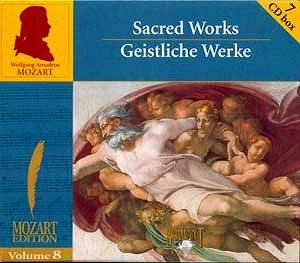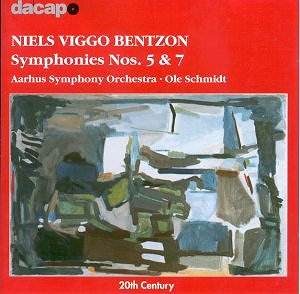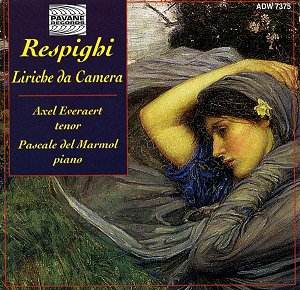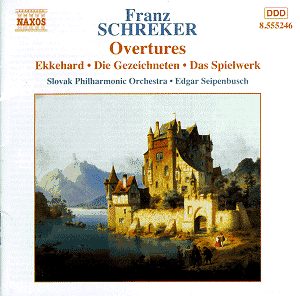 Composer: Wolfgang Amadeus Mozart
Composer: Wolfgang Amadeus Mozart
Works: Requiem in D minor KV 626; Litaniae de venerabili altaris sacramento in E flat major, KV 243; Litaniae Lauretanae in B flat major, KV 109; Litaniae de venerabili altaris sacramento in B flat major, KV 125; Litaniae Lauretanae in D major, KV 195; Vesperae solennes de Dominica in C major, KV 321; Vesperae solennes de Confessore in C major, KV 339; Regina Coeli in C major, KV 108; Regina Coeli in B flat major, KV 127; Sancta Maria, Mater Dei in F major, KV 273; Regina Coeli in C major, KV 276; Scande coeli limina in C major, KV 34; Inter natos mulierium in G major, KV 72; Benedictus sit Deus in C major, KV 117; Sub tuum praesidium in F major, KV 198; Misericordias Domini in D minor, KV 222; Venite populi in D major, KV 260; Alma Dei Creatoris in F major, KV 277; God is our refuge KV 20; Miserere, in A minor, KV 85; Quaerite primum regnum Dei in D minor, KV 86; Zwei deutsche Kirchenlieder KV 343; O Gottes Lamm in F major, KV 343a; Als aus Aegypten in C major, KV 343b; Veni sancte Spiritus in C major, KV 47; Te Deum Laudamus in C major, KV 141; Ergo interest in G major, KV 143; Kommet her, ihr frechen Sünder in B flat major, KV 146; Exsultate, jubilate in F major, KV 165; Dixit Dominus-Magnificat in C major, KV 193; Tantum ergo in D major, KV 197; Ave verum corpus in D major, KV 618
Performers: Nordic Chamber Choir; Süddeutsches Kammerorchester Pforzheim; Kammerorchester Mannheim; Nicol Matt, conductor
Recording: July 2001, Alte Kirche, Fautenbach, Germany
Label: Brilliant Classics
The recent release of Mozart’s sacred works in the Brilliant Classics edition provides a comprehensive overview of the composer’s ecclesiastical output, revealing both the depths of his ingenuity and the intricacies of his liturgical settings. This collection spans from the monumental Requiem in D minor, KV 626, to a variety of shorter liturgical pieces, showcasing the duality of Mozart’s sacred music—where profound spirituality meets the elegance of classical form.
The performance by the Nordic Chamber Choir, under the direction of Nicol Matt, showcases a commendable blend of precision and expressivity. The choir’s clarity of tone is particularly evident in the Requiem, where the opening “Introitus” unfolds with a solemn gravity. However, while the choir demonstrates commendable cohesion, the soloists, though capable, lack the distinct charisma that can elevate such a weighty work. Their performances do not resonate with the gravitas found in the interpretations of more renowned ensembles, which might leave some listeners yearning for a deeper emotional engagement.
In examining the interpretation choices, one notes that the pacing throughout the collection is generally well-judged, balancing between the energetic exuberance present in works like “Exsultate, jubilate” and the reflective solemnity of the “Miserere.” The choir’s handling of dynamics is particularly noteworthy; moments of hushed intensity contrast effectively with the more robust passages. Matt’s direction allows for a homogeneity of sound that, while pleasing, sometimes lacks the dramatic contrasts found in other recordings. For instance, the “Litaniae de venerabili altaris sacramento” in E flat major, KV 243, offers an opportunity for more nuanced contrasts that are not fully exploited in this rendition.
The recording quality is commendable, with a clear and spacious acoustic that enhances the choral textures. Each voice is distinct, allowing the listener to appreciate the intricate contrapuntal lines Mozart weaves. However, the overall sound could benefit from a bit more warmth, as the engineering leans towards a slightly clinical presentation. This is particularly noticeable in the passages with greater harmonic complexity, such as the “Dixit Dominus-Magnificat,” where a richer resonance could have further highlighted the lushness of Mozart’s orchestration.
When placed alongside other notable recordings of Mozart’s sacred music, this set stands as a solid, if not definitive, choice. Comparatively, the interpretations by conductors such as John Eliot Gardiner or Nikolaus Harnoncourt offer a heightened sense of drama and character, particularly in the Requiem. However, the Nordic Chamber Choir shines in its commitment to clarity and precision, particularly in lesser-known works like the “Regina Coeli” and various liturgical songs, which deserve more attention in the broader context of Mozart’s oeuvre.
Exploring this collection reveals a wealth of discovery for the listener. While not every work reaches the heights of Mozart’s most celebrated masterpieces, the Nordic Chamber Choir’s performances illuminate the subtleties and beauty found in these sacred compositions. The set serves as an engaging gateway into the ecclesiastical dimensions of Mozart’s artistry, offering both seasoned aficionados and new listeners an opportunity to appreciate the breadth of his liturgical output. The affordability of this collection further enhances its appeal, ensuring that a diverse array of Mozart’s sacred music is accessible to a wide audience.



